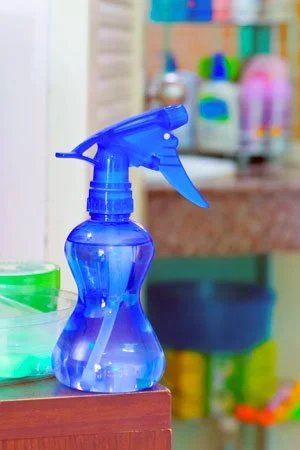We may earn revenue from the products available on this page and participate in affiliate programs. Learn More ›
We’ve all seen the bottles of glass cleaner vying for our dollars on supermarket shelves. But there’s an economical alternative to both the bright blue stuff mom brought home that generally relies on ammonia and new-fangled “green” versions that promise a planet-friendly way to banish grease, grime, and dirt. It will take you just minutes to prepare this totally non-toxic homemade glass cleaner with ingredients you no doubt already have on hand. You’ll find it a lot cheaper than all the commercial versions and every bit as safe for people, pets, and the environment as fancy natural brands. So whip it up, and get gleaming!
MATERIALS AND TOOLS
– White vinegar
– Water
– Spray bottle
– Essential oil(s)
– Microfiber cloth
– Newspaper (optional)
STEP 1
Pour 2 cups of water into a spray bottle. Add 1/4 cup of white vinegar. That’s really all you really need to clean any glass surface, as well as tile, stainless steel, chrome, and more. Since white vinegar contains 5 percent acetic acid, it has antimicrobial properties and is considered an effective general disinfectant.
STEP 2
Vinegar has a fairly pungent odor, so to make the solution more pleasant-smelling add 10 to 15 drops of your favorite essential oil(s). Lemon, lavender, rosemary, mint, and orange all have a fresh, clean scent, but you may wish to mix a few to create a signature blend.

STEP 3
Screw the top onto the spray bottle and shake to mix thoroughly. Feel free to make a double, triple, or even quadruple batch to keep in a large jug.
STEP 4
Your homemade glass cleaner is now ready to use!
- To give windows a streak-free shine, first wipe off surface dust, then spray the cleaner directly onto the pane and wipe off with balled-up newspaper. Skip paper towels, which tend to leave lint and smudges.
- When it comes to mirrors, avoid spraying your homemade glass cleaner directly onto the surface. You’ve probably seen older mirrors that have a brownish-black bloom around the edges, a result of glass cleaner seeping behind the mirror and eroding the silver backing. Once that damage is done, it can’t be reversed, so spray the cleaner onto a piece of newspaper or a microfiber cloth, and then wipe the mirror clean.
- To clean and disinfect various types of metal as well as tile, Formica, laminate, and a host of other materials, rely on the one-two punch of your homemade glass cleaner and a microfiber cloth. Spray the surface directly, and then as you wipe, the tiny fibers in the cloth will attach themselves to not merely dirt but particles as small as bacteria.
- Spray away on countertops, appliances, floors, and more with these exceptions: Do not use glass cleaner on natural stone like granite or marble, which could be damaged by the vinegar’s acid. Also be wary with wood—vinegar could mar the finish. And if you’ve got an egg spill, reach for soap and water. Acidity can make the egg coagulate, and harder to clean up.

